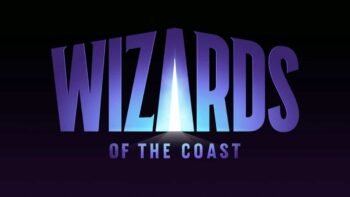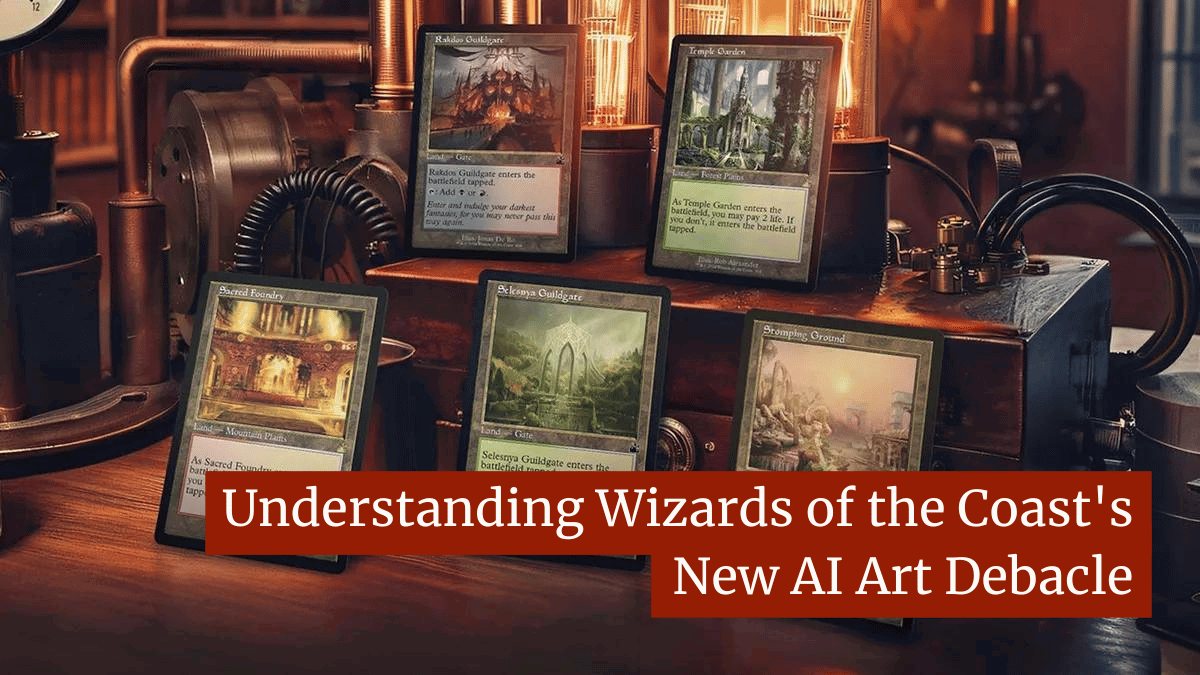Understanding Wizards of the Coast’s New AI Art Debacle

Back in August 2023, fans noticed that artwork in an upcoming sourcebook for Dungeons & Dragons (D&D) appeared to have been generated by using AI. These suspicions were soon confirmed in since-deleted tweets by the artist, who admitted to having used AI to “polish” several illustrations.
This prompted Wizards of the Coast (WoTC), the owners of D&D, to announce that they were updating their artist guidelines to make it clear that they must “Refrain from using AI art generation as part of their art creation process.”
That seemed to bring an end to that scandal. However, on January 4, the company posted on X (formerly Twitter) a marketing image for an upcoming Magic: The Gathering (MtG) set entitled Ravinica Remastered.
The image featured five cards from the 300-card set against a Victorian England/steampunk background. However, in that background, users found still more evidence of AI generation including elements that did not fit together correctly and other artifacts.
Initially, the company denied that the work was the product of AI, saying in a post on X that, “This art was created by humans and not AI.” However, fans noticed even more issues with the artwork, forcing WoTC to acknowledge that the work was indeed created using AI elements.
In that response, WoTC apologized for the incident but blamed an unnamed vendor for the problem. The company then thanked their “diligent community” for pointing out that AI components had “crept into” their marketing. They further said they plan to update their rules for marketing partners to bar the use of AI.
However, that has not done much to calm the anger from many fans, who felt lied to by both the August 2023 response and the immediate response to these allegations. Despite the apologies, many are still upset and are venting their frustrations by mocking the company.
So, this raises a question: Where did the company go wrong? To find the answer we must go back at least a year.
Wizards of the Coast’s Long 2023
2023 was not a good year for WoTC’s relationship with its fans. Even as the commercial and critical success of the video game Baldur’s Gate 3 bouyed the company to new financial highs, its reputation with its fans took blow after blow.
The company, started the year with a controversy over how it licenses the system resource document for D&D, which would have severely restricted use of the material when creating new works based on D&D’s mechanics.
The company quickly backed off those changes following a fan revolt. But in April the company sent detectives to a YouTuber’s house to reclaim some prerelease cards he had received due to a shipping issue. This caused another round of controversy over alleged intimidation tactics the detectives investigating the cause are accused of having used.
Then, in May, the company was accused of removing the signature of Jeff Easley, a fantasy artist best known for his work on D&D books, from a movie poster for a then-upcoming film. Though Paramount ended up being the one responsible for the removal, it was yet another fan backlash directed at WoTC.
In August, the company had to weather the aforementioned AI scandal and then, in November, one of the best known MtG artists, David Sondered, was accused of plagiarizing a fan art creation when creating art for a game card.
That, combined with the latest scandal, makes six notable fan backlashes in one year for WoTC. It seems as if, once every two months or so, WoTC has found itself at the center of fan backlashes over copyright, plagiarism, or related issues.
While many of these cases are not directly their fault, the company has, historically, worked hard to keep its large fan base happy. But what went wrong over the past year is not just a run of bad luck, it is a lack of preparation and consideration.
What Went Wrong
The first two incidents, namely the licensing debacle and the alleged intimidation over prerelease cards, can be chalked up to WoTC attempting to exert greater control over their intellectual property.
During the licensing backlash, WoTC expressed frustration that some users had made substantial amounts of money off the back of their work without paying a royalty. While that may be understandable, the company had a long history of being permissive with its creations, and the fan base had come to rely upon it. Simply put, moving the goal posts back was always going to be difficult, controversial and likely misguided.
It seems that the company has learned from those mistakes and has backed off, trying to restore the original equilibrium. However, its handling of AI and plagiarism has shown it to be a company that is woefully unprepared for the current climate in the art world.
Back in March 2021, WoTC faced a different, but similar MtG plagiarism scandal to the 2023 one. This one involved long-time artist Jason Felix, who was accused of plagiarizing a lesser-known artist for one of his card designs. The company published a statement, announcing that it was suspending ties with Felix.
That, largely, brought an end to the controversy. However, it should have been a warning shot. The company could have, and should have, performed a thorough examination of all of Felix’s work and set up policies and procedures internally to help detect plagiarized or otherwise copied artwork.
However, they did not do that, and they were caught off guard by a remarkably similar plagiarism story that happened less than three years later.
Something similar happened with the recent AI scandals. The story in August should have been a warning that AI was going to be a significant issue for them and that their fan base was both “diligent” about the issue and would anger quickly if it happened again.
While creating the new artist policy was a good first step, they clearly did not think about the issue much past that. Setting a similar policy for all marketing materials and other art is a natural step and one that they clearly did not take.
What was a warning that AI was going to present widespread challenges was instead used to address the topic in a limited way, and they clearly did not update their strategy as the way AI was being used evolved.
Some of that can be forgiven. AI is a rapidly changing space and even the best and brightest are struggling to keep up with the various uses and applications. However, as a company that has staked much of its reputation on selling cards and books covered in human-created art, WoTC needed to put in a much better effort.
To make matters even worse for WoTC, when initially confronted with the latest AI allegations, they quickly denied them outright. That made them look foolish when they had to retract that denial and clarify the record later. While it is most likely that they simply responded before they had all the information, that has not helped their trustworthiness in this space.
In short, by failing to get ahead of these issues, they have ensured that they will be ongoing problems. That could be a huge problem both given what WoTC is best known for and how their fans feel about these topics.
Bottom Line
To put it bluntly, WoTC screwed up here and did so in a way that I would describe as actively negligent. Not only did they initially deny the use of AI, despite unambiguous evidence that it was used, they failed to learn the lessons of August 2023 and take the issue seriously companywide.
While creating a policy barring artists from using AI is a great first step, what about the use of AI in writing, in marketing, in video production, etc.? Furthermore, how is this policy enforced? How are you ensuring that those you work with are complying with the rules? What are the penalties for those caught using AI in violation of the rules?
In August they created a policy that only addressed the issue that was current at the time and did so in a very surface way. These issues, AI and plagiarism, strike to very core of what WoTC is and what it is loved for.
Addressing these issues requires an equally fundamental response from the company and they have clearly not done that. While they seem to have learned at least some lessons from 2023, they clearly did not learn the most important ones.
So, while last year was a banner year for them financially, they may find themselves struggling to maintain their passionate fan base that made that success possible. Without major changes and new policies, they risk becoming known as much for plagiarism and AI generated art as anything else.
That, in turn, might make it more difficult for fans to get excited about the next major MtG or D&D release.
Want to Reuse or Republish this Content?
If you want to feature this article in your site, classroom or elsewhere, just let us know! We usually grant permission within 24 hours.
